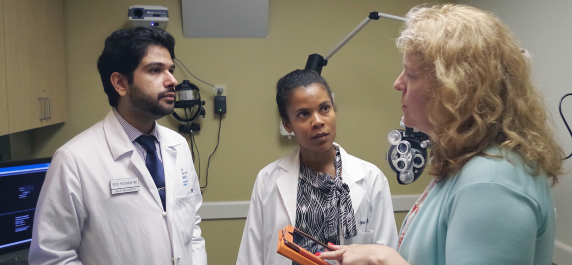About the Profession
Health sciences librarians are master’s-degreed information professionals, librarians, or informaticists who have special knowledge in finding, accessing, and sharing quality health information resources with clinicians, nurses, pharmacists, and other members of the health care team. Many health information professionals also provide information to patients and their families.
Essential Members of the Health Care Team
Using materials and tools that range from traditional print journals to electronic databases and the latest mobile devices, health sciences librarians use innovative strategies to access and deliver important information for patient care, research, and publication. Examples of how health sciences librarians work as part of the health care team include:
- answering a surgeon’s call from a hospital emergency room for rush information
- helping a researcher develop a systematic review article for a prestigious journal by conducting an expert search of the literature.
- connecting licensed electronic resources and decision tools into a patient’s electronic medical record.
- finding consumer health information in a patient’s native language.
Health sciences librarians also work in the following capacities and roles:
- reference and consumer health librarians
- web managers
- medical informatics specialists
- chief information officers
- embedded information specialists
- copyright and licensing experts
- data managers
- educators
- patient safety advocates
- knowledge managers
Where Do Health Sciences Librarians Work?
Anywhere health and biomedical information is needed! This includes academic medical centers and medical schools; hospitals, health systems, and clinics; colleges, universities, and professional schools; consumer health libraries; research centers and foundations; industry, including biotechnology, insurance, medical equipment, pharmaceutical, and publishing; and federal, state, and local government agencies.

What Do Health Information Professionals Need to Know?
- Locate, evaluate, synthesize, and deliver authoritative information in response to biomedical and health inquiries.
At the core of what we do is find information to answer biomedical and health-related questions at the point of need. We are experts in assessing information needs and delivering information in a format and means of delivery best suited to the individuals and groups making requests.
- Curate and makes accessible bioscience, clinical, and health information data, information, and knowledge.
Our strength is our ability to develop and organize collections tailored to specific audiences. In cataloging and classifying, including assigning metadata, we impose order to improve access. Most recently our expertise is being applied to organizing research data into collections that can be used electronically across institutions and countries. We know the value of and how to apply standards so that records of collections are universally comprehensible and enduring.
- Educate others in the skills of bioscience, clinical, and health information literacy.
We help others, but we also enable people to be self-sufficient. What we teach continues to evolve, from how to use resources, to how to critically appraise research articles, to how to organize data collections. Our teaching role requires that we be skilled in pedagogy and the use of technology-enhanced learning.
- Manage personnel, time, budget, facilities, and technology and lead others to define and meet institutional goals.
Every health information professional has personal management responsibilities. Institutional management and leadership roles require skills beyond those learned through formal education. Management skills and a leader’s abilities affect the culture and performance of coworkers and the effectiveness of an institution.
- Evaluate research studies, use research to improve practice, conduct research, and communicate research results.
We promote and teach the skills of evidence-based medicine—and we also need to apply these skills to our own practice. Newer research methodologies—such as community-based action research, outcomes research, and data mining—can be useful in analyzing our activities and impact.
- Promote the development of the health information professions and collaborate with other professionals to improve health care and access to health care information.
As members of a profession, we are motivated to contribute to society in ways that highlight our special knowledge and expertise.

